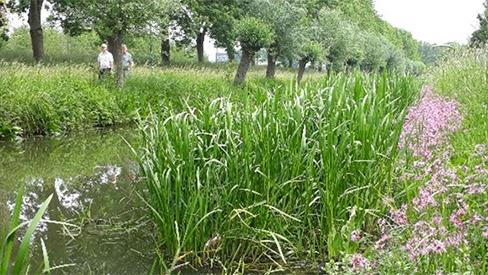Don’t Let Your Voice Drown
Why Voting in the Dutch Water Authority Elections Matters

To explain what the water authorities (waterschappen) are, let’s first take a quick look at its history. You may know that 26 per cent of the Netherlands, including Utrecht, is situated below sea level. This is possible thanks to extensive water management, which started in the 13th century. Villagers worked together to drain the marshy, peaty landscape and transform it into a landscape suitable for agriculture. These teams of cooperating villagers were the first "water authorities" and are said to be the oldest governing bodies in the country. The Dutch term "polder model" refers to decision-making based on consensus and is said to originate from the decision-making process related to water management in the polders. Today, the Netherlands is divided into 21 water authorities which are responsible for the quality (cleanliness) and quantity of water (keeping us dry but also preventing droughts). The city of Utrecht and its surroundings are part of a water authority called Hoogheemraadschap De Stichtse Rijnlanden.
The dilemmas
The water authorities face many dilemmas. For example, less groundwater is useful for agriculture in the spring, when farmers use their machines on the land. However, high levels of groundwater are beneficial for nature areas and the climate. Another issue is what to do with all the land maintained by the water authorities. This land can be kept untouched or used for other purposes, such as wind power stations or recreation areas. Residents can influence the decision-making process by voting on one of the candidates.
Why should I vote?
As an international student, you're probably asking yourself: "Okay, but why should I care?" Apart from the fact that voting abroad is a pretty cool bucket list item, there are several other reasons:
- As a resident of the Netherlands, you rely on the water authorities to protect you against floods and ensure access to clean water.
- The water authorities can influence the energy transition. For example, 20,000 houses in Overvecht are powered by sustainable energy generated from the heat of wastewater.
- As climate change is a global concern, the way the Netherlands manages its water can provide valuable lessons for other countries.
- As an international student, you also pay taxes that go to the water authorities.
How can I vote?
Voting is pretty straightforward. You just need a voting pass (stempas) and an EU identity card, EU passport, EU driver’s licence, or residence permit. You should already have received the voting pass by mail. If not, you can request one from the municipality. With your voting pass and identity card/passport/driver’s licence/residence permit in hand, you can go to one of the polling stations in Utrecht to cast your vote.
In addition to the ten parties also participating in the national elections, there are four parties running that only focus on the Water Authority Elections. National parties Groenlinks, D66 and VOLT do not participate in the Water Authority Elections because they support Water Natuurlijk, an organisation founded by NGOs working in the fields of the environment and recreation. The remaining three parties are called AWP voor water, Klimaat en Natuur (a collaboration between independent experts for water and climate and Waterschap@inwonersbelangen, which consists of a number of local political parties) and Ondernemend Water, a party for and by entrepreneurs.
Wyke Smit is a UU graduate in Sociology and Environmental Studies currently serving as the Director of FSC Netherlands. She is also a candidate in these elections, representing the Water Natuurlijk party. Indigo Tjan is a student at University College Utrecht, majoring in Politics and Law. He is a current member of UCU's Student Council.
Relevant websites:
Information about Dutch political parties (in English)
Website of waterschap Hoogheemraadschap de Stichtse Rijnlanden (in English)
Voting application for waterschap Hoogheemraadschap de Stichtse Rijnlanden (in Dutch)
Information about the elections (in English)